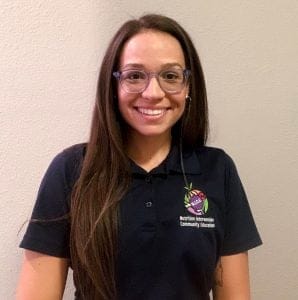 A diagnosis of lactose intolerance hit then-13-year-old Clara Rivera hard. With little guidance from medical experts about how to change her diet, she and her family simply cut out all dairy products – with devastating effects.
A diagnosis of lactose intolerance hit then-13-year-old Clara Rivera hard. With little guidance from medical experts about how to change her diet, she and her family simply cut out all dairy products – with devastating effects.
“I had stunted growth,” says Rivera of the consequences of inadequate nutrient intake, “and I fell into a lot of deficiencies, mostly because I didn’t know. We didn’t have that [nutrition] education.”
So she began experimenting in the kitchen, first by creating dairy-free meals and later branching out to gluten-free dishes and sugar-free snacks. She relished making everyday foods healthy and learned firsthand the value of educating others about food choices and balanced diets.
“I was destined to be a dietitian before I knew what a dietitian was,” says the master’s student in the dietetics and nutrition department at the Robert Stempel College of Public Health & Social Work who in January began an internship at Jackson Memorial Hospital.
“It’s really exciting ,” Rivera says of her new challenge, “because it’s the largest hospital in South Florida. It’s totally new to me. I’m learning a little bit of everything. You really dip your toes in so many aspects of dietetics.”
Rivera was recently awarded a scholarship by the Florida Academy of Nutrition and Dietetics, which she is using to cover expenses as she completes the unpaid internship. As a mom, student and research assistant at the Nutrition Intervention and Community Education Lab on campus, she calls the financial assistance “a great relief” as she juggles a busy life.
Rivera and two other FIU interns are currently completing a food service rotation that has them conducting a study of food waste, analyzing budgets and learning how to use the department’s computer software. They are also learning how the hospital changed its protocols to address COVID-19, which included everything from redesigning physical space to details as small as how to differently organize the food and utensils on a tray.
“You would think in a massive hospital like Jackson it would be very difficult to quickly adjust, but I’ve talked to so many supervisors and employees. They did adjust,” Rivera says. “They made it work. One thing I want to take from this internship is that we need to be very adaptable. We can change and adjust and prepare.”
That’s a message she delivered to children this past summer as a nutrition educator for a national nonprofit called Common Threads. She led virtual lessons during which she explained terms and shared healthy food recipes – something she would have appreciated as a teen.
“Many of the children came from low-income families,” Rivera says, “and part of it was about how to make due with what you have access to.
“Information is power,” she says of what she aimed to give the youngsters. “I love that part.”
